Unit10 I'd like some noodles.课文单词精讲精练 人教版七年级英语下册(无答案)
文档属性
| 名称 | Unit10 I'd like some noodles.课文单词精讲精练 人教版七年级英语下册(无答案) | 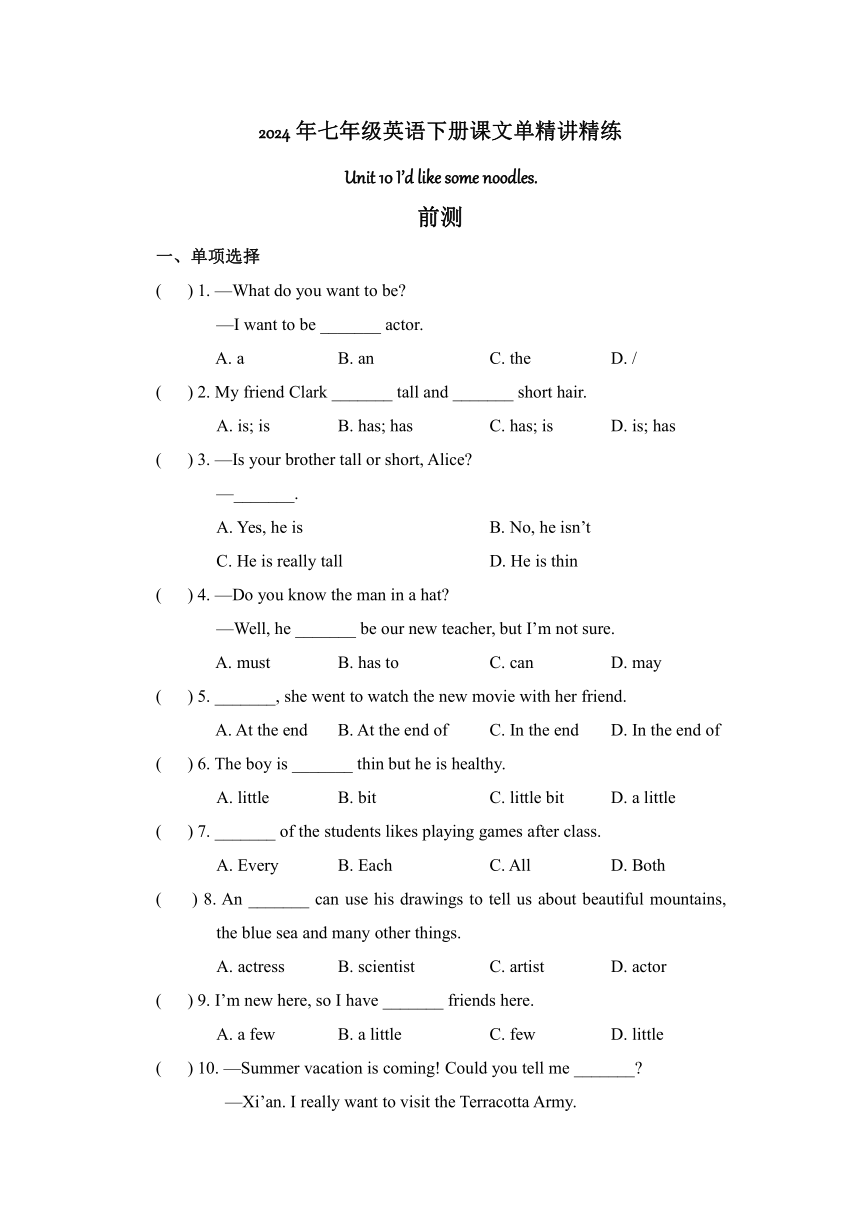 | |
| 格式 | docx | ||
| 文件大小 | 59.7KB | ||
| 资源类型 | 教案 | ||
| 版本资源 | 人教新目标(Go for it)版 | ||
| 科目 | 英语 | ||
| 更新时间 | 2024-03-05 20:14:01 | ||
图片预览

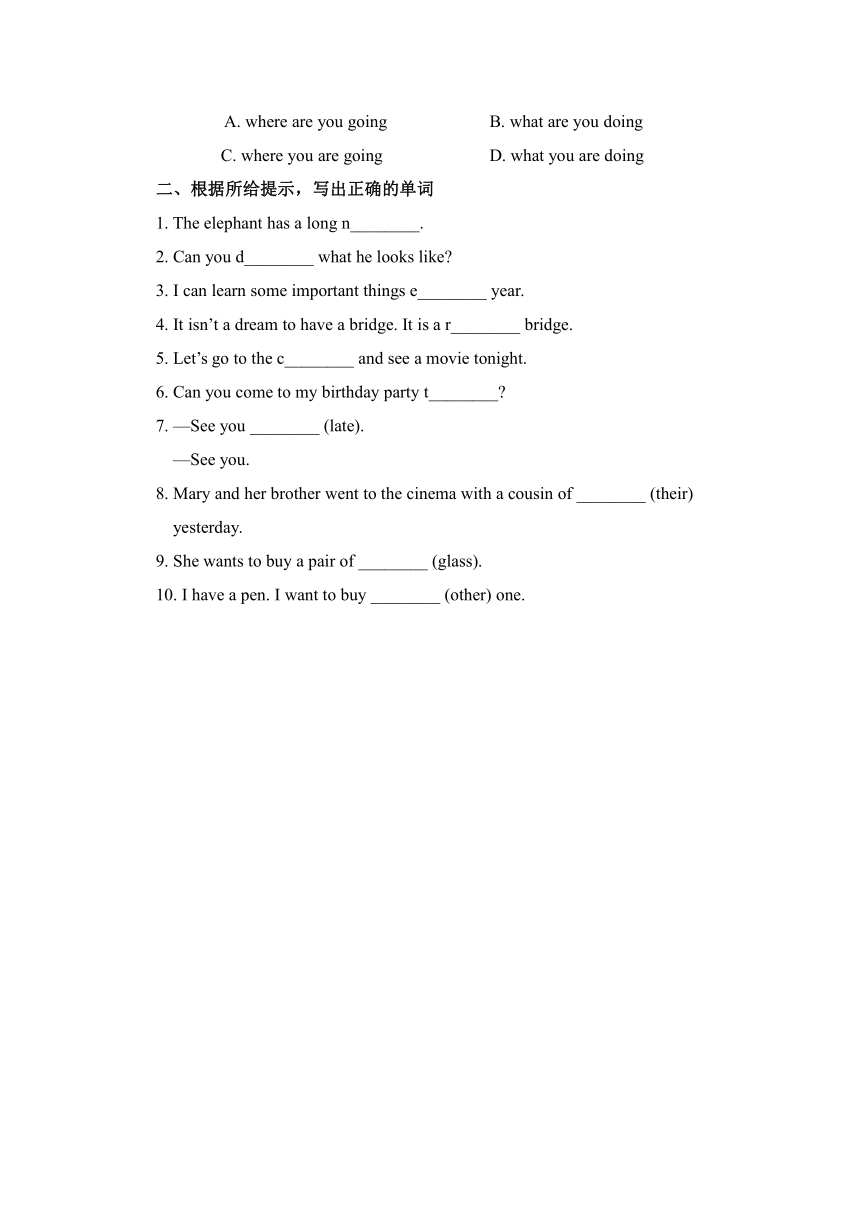
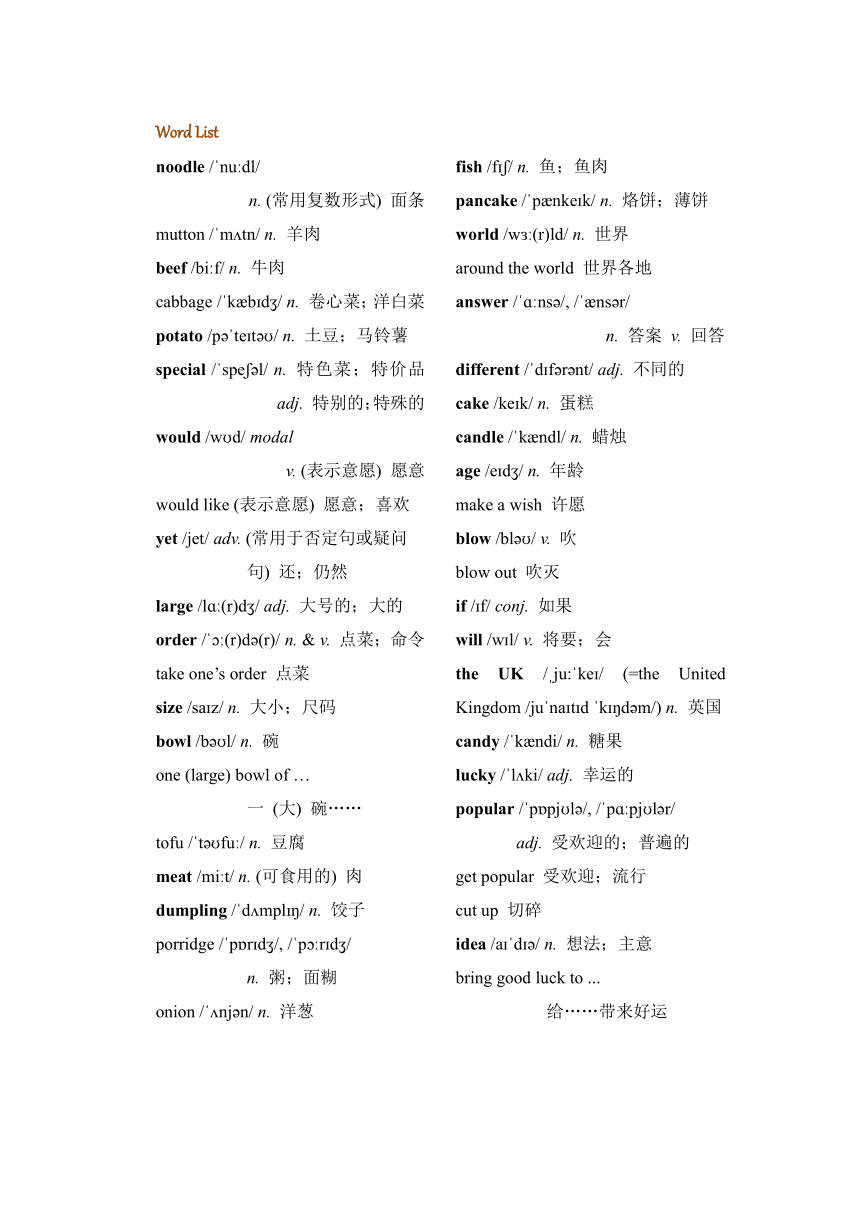
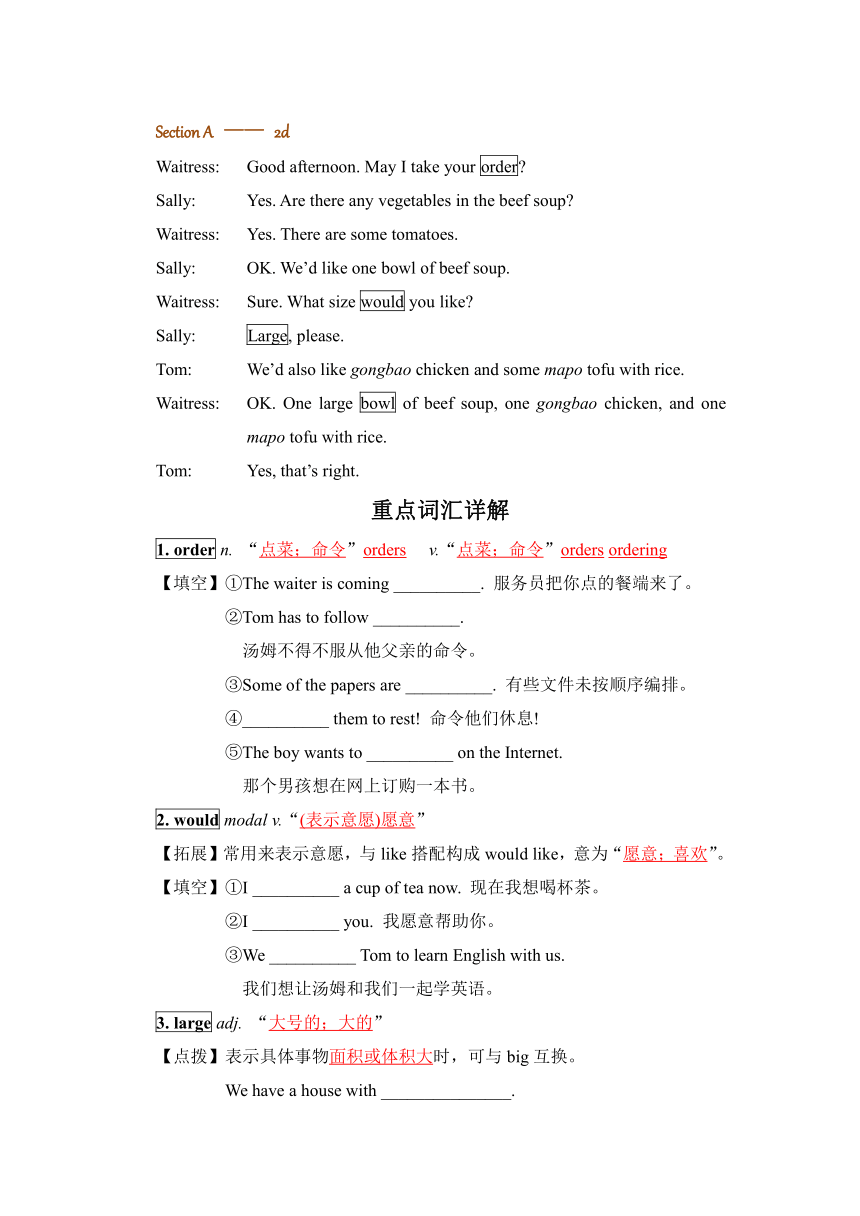
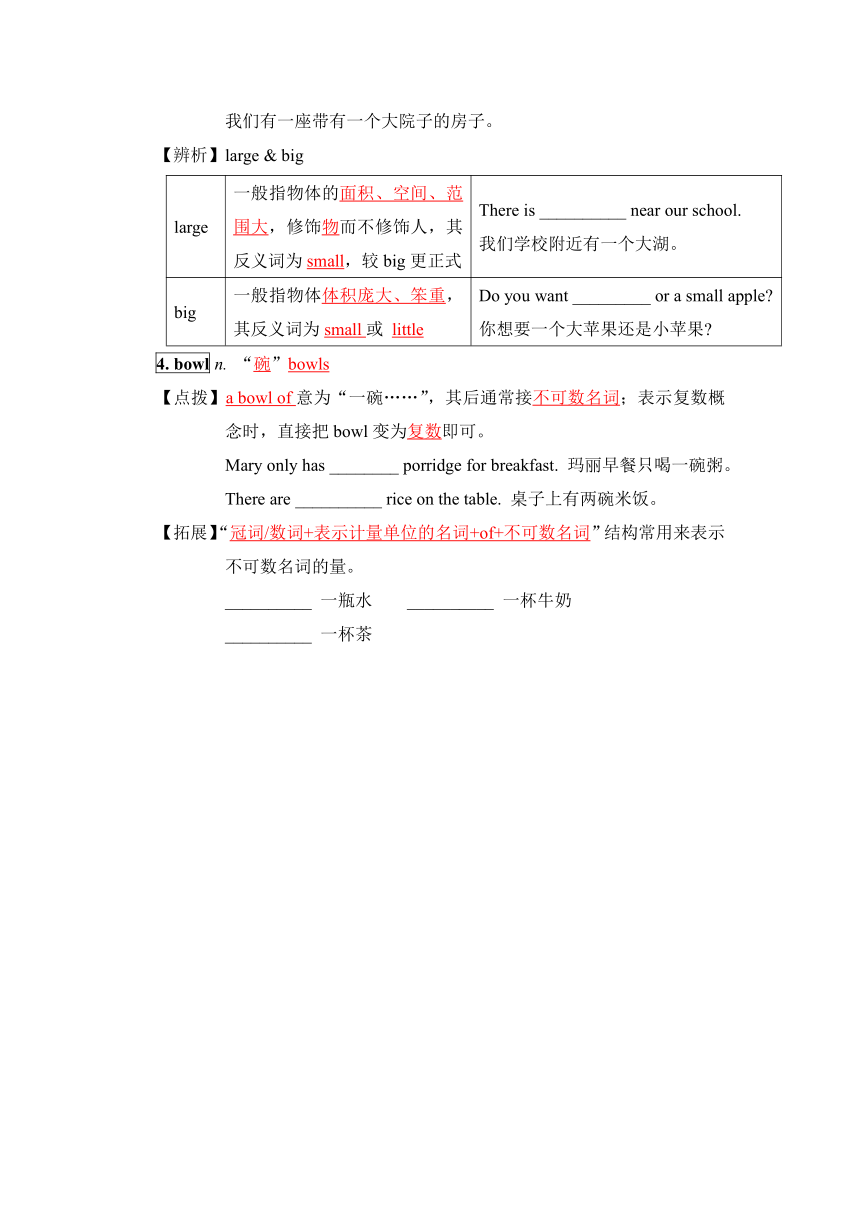
文档简介
2024年七年级英语下册课文单精讲精练
Unit 10 I’d like some noodles.
前测
一、单项选择
( ) 1. —What do you want to be
—I want to be _______ actor.
A. a B. an C. the D. /
( ) 2. My friend Clark _______ tall and _______ short hair.
A. is; is B. has; has C. has; is D. is; has
( ) 3. —Is your brother tall or short, Alice
—_______.
A. Yes, he is B. No, he isn’t
C. He is really tall D. He is thin
( ) 4. —Do you know the man in a hat
—Well, he _______ be our new teacher, but I’m not sure.
A. must B. has to C. can D. may
( ) 5. _______, she went to watch the new movie with her friend.
A. At the end B. At the end of C. In the end D. In the end of
( ) 6. The boy is _______ thin but he is healthy.
A. little B. bit C. little bit D. a little
( ) 7. _______ of the students likes playing games after class.
A. Every B. Each C. All D. Both
( ) 8. An _______ can use his drawings to tell us about beautiful mountains, the blue sea and many other things.
A. actress B. scientist C. artist D. actor
( ) 9. I’m new here, so I have _______ friends here.
A. a few B. a little C. few D. little
( ) 10. —Summer vacation is coming! Could you tell me _______
—Xi’an. I really want to visit the Terracotta Army.
A. where are you going B. what are you doing
C. where you are going D. what you are doing
二、根据所给提示,写出正确的单词
1. The elephant has a long n________.
2. Can you d________ what he looks like
3. I can learn some important things e________ year.
4. It isn’t a dream to have a bridge. It is a r________ bridge.
5. Let’s go to the c________ and see a movie tonight.
6. Can you come to my birthday party t________
7. —See you ________ (late).
—See you.
8. Mary and her brother went to the cinema with a cousin of ________ (their)
yesterday.
9. She wants to buy a pair of ________ (glass).
10. I have a pen. I want to buy ________ (other) one.
Word List
noodle / nu dl/
n. (常用复数形式) 面条
mutton / m tn/ n. 羊肉
beef /bi f/ n. 牛肉
cabbage / k b d / n. 卷心菜;洋白菜
potato /p te t / n. 土豆;马铃薯
special / spe l/ n. 特色菜;特价品 adj. 特别的;特殊的
would /w d/ modal
v. (表示意愿) 愿意
would like (表示意愿) 愿意;喜欢
yet /jet/ adv. (常用于否定句或疑问
句) 还;仍然
large /lɑ (r)d / adj. 大号的;大的
order / (r)d (r)/ n. & v. 点菜;命令
take one’s order 点菜
size /sa z/ n. 大小;尺码
bowl /b l/ n. 碗
one (large) bowl of …
一 (大) 碗……
tofu / t fu / n. 豆腐
meat /mi t/ n. (可食用的) 肉
dumpling / d mpl / n. 饺子
porridge / p r d /, / p r d /
n. 粥;面糊
onion / nj n/ n. 洋葱
fish /f / n. 鱼;鱼肉
pancake / p nke k/ n. 烙饼;薄饼
world /w (r)ld/ n. 世界
around the world 世界各地
answer / ɑ ns /, / ns r/
n. 答案 v. 回答
different / d f r nt/ adj. 不同的
cake /ke k/ n. 蛋糕
candle / k ndl/ n. 蜡烛
age /e d / n. 年龄
make a wish 许愿
blow /bl / v. 吹
blow out 吹灭
if / f/ conj. 如果
will /w l/ v. 将要;会
the UK / ju: ke / (=the United Kingdom /ju na t d k d m/) n. 英国
candy / k ndi/ n. 糖果
lucky / l ki/ adj. 幸运的
popular / p pj l /, / pɑ pj l r/
adj. 受欢迎的;普遍的
get popular 受欢迎;流行
cut up 切碎
idea /a d / n. 想法;主意
bring good luck to ...
给……带来好运
Section A —— 2d
Waitress: Good afternoon. May I take your order
Sally: Yes. Are there any vegetables in the beef soup
Waitress: Yes. There are some tomatoes.
Sally: OK. We’d like one bowl of beef soup.
Waitress: Sure. What size would you like
Sally: Large, please.
Tom: We’d also like gongbao chicken and some mapo tofu with rice.
Waitress: OK. One large bowl of beef soup, one gongbao chicken, and one mapo tofu with rice.
Tom: Yes, that’s right.
重点词汇详解
1. order n. “点菜;命令”orders v.“点菜;命令”orders ordering
【填空】①The waiter is coming __________. 服务员把你点的餐端来了。
②Tom has to follow __________.
汤姆不得不服从他父亲的命令。
③Some of the papers are __________. 有些文件未按顺序编排。
④__________ them to rest! 命令他们休息!
⑤The boy wants to __________ on the Internet.
那个男孩想在网上订购一本书。
2. would modal v.“(表示意愿)愿意”
【拓展】常用来表示意愿,与like搭配构成would like,意为“愿意;喜欢”。
【填空】①I __________ a cup of tea now. 现在我想喝杯茶。
②I __________ you. 我愿意帮助你。
③We __________ Tom to learn English with us.
我们想让汤姆和我们一起学英语。
3. large adj. “大号的;大的”
【点拨】表示具体事物面积或体积大时,可与big互换。
We have a house with _______________.
我们有一座带有一个大院子的房子。
【辨析】large & big
large 一般指物体的面积、空间、范围大,修饰物而不修饰人,其反义词为small,较big更正式 There is __________ near our school. 我们学校附近有一个大湖。
big 一般指物体体积庞大、笨重,其反义词为small或 little Do you want _________ or a small apple 你想要一个大苹果还是小苹果
4. bowl n. “碗”bowls
【点拨】a bowl of意为“一碗……”,其后通常接不可数名词;表示复数概念时,直接把bowl变为复数即可。
Mary only has ________ porridge for breakfast. 玛丽早餐只喝一碗粥。
There are __________ rice on the table. 桌子上有两碗米饭。
【拓展】“冠词/数词+表示计量单位的名词+of+不可数名词”结构常用来表示不可数名词的量。
__________ 一瓶水 __________ 一杯牛奶
__________ 一杯茶
Section B —— 2b
Birthday Food Around the World What would people like to eat on their birthday The answer would be different in different countries. In many countries, people have birthday cakes with candles. The number of candles is the person’s age. The birthday person must make a wish and blow out the candles. If he or she blows out all the candles in one go, the wish will come true. In the UK, people sometimes put a candy in a birthday cake. The child with the candy is lucky. In China, it is getting popular to have cake on your birthday. But many people still eat very long noodles for their birthday. They never cut up the noodles because the long noodles are a symbol of long life. In some places, Chinese people also eat eggs on their birthday. They are a symbol of life and good luck. All of these birthday foods may be different, but the ideas are the same. They bring good luck to the birthday person.
重点词汇详解
1. around the world“世界各地”,相当于all over the world
【填空】①There are a lot of places of interest _______________.
世界各地有许多名胜。
②We have friends _______________. 我们的朋友遍布世界。
2. answer n. “答案”answers v.“回答”answers answering
【短语】the answer to the question “_______________”
【填空】①I don’t know __________ this question. 我不知道这个问题的答案。
②The boy __________ this question. 那个男孩回答不出这个问题。
③He __________ a smile. 他微笑作答。
3. different adj. “不同的”
【短语】be different from… “_______________”
【填空】My pen ____________________. 我的钢笔与你的钢笔不同。
4. the number of“……的数量”
【点拨】后跟复数名词或代词,作主语时谓语动词用单数。
____________________ in our class ___ 45. 我们班学生的数量是45。
【拓展】a number of“许多……”跟可数名词复数作主语时谓语动词用复数。
①____________________ playing basketball on the playground.
许多学生在操场上打篮球。
②There are ____________________ in our city.
我们城市有相当多的教师。
5. make a wish “许愿”
【拓展】make sb. do sth.“让某人做某事”
make为使役动词,其后接不带to的动词不定式作宾补。
Don’t ____________________ late.不要让他睡过头。
【拓展】①“make sb./sth.+形容词”表示“使某人/某物处于某种状态”。
I like reading books because books can _______________.
我喜欢读书,因为书籍能使我快乐。
②make friends (with sb.)意为“(与某人)交朋友”。
Tom ____________________. 汤姆交了一些中国朋友。
6. blow out“吹灭”
【点拨】blow out是“动副”短语,后接名词作宾语时,宾语可以紧跟其后,
也可置于blow与out之间,但接代词作宾语时,必须放在blow与
out之间。
【填空】①Let’s _______________. 咱们吹灭蜡烛吧。
②The candles are burning. Don’t _______________.
蜡烛正在燃烧。不要吹灭它们。
7. if conj. “如果”
【点拨】在if引导的条件状语从句中,主句用一般将来时, 从句用一般现在
时表示将来,即“主将从现”。
【填空】①If it _____ tomorrow, we will not go to the zoo.
如果明天下雨,我们将不去动物园。
②If you __________, you’ll catch up with others.
如果你努力学习,你会赶上其他人。
8. lucky adj. “幸运的” __________! 你是幸运的!
【拓展】luck为不可数名词,意为“幸运”; __________! 好运!
luckily adv. “幸运地;好运地”通常放在句首,用来修饰整个句子。
__________, we got there on time. 幸运的是,我们准时到达了那里。
9. popular adj. “受欢迎的;普遍的”
【短语】__________ 变得流行 __________ 受到……的欢迎/喜爱
【填空】①She is __________. 她很受欢迎。
②Young people like __________. 年轻人喜欢流行歌曲。
③WeChat is __________ now. 微信现在越来越流行了。
④Pop music __________ young people.
流行音乐受到年轻人的欢迎。
10. cut up“切碎”
【点拨】cut up是“动副”型短语,代词作宾语时只能放在中间;名词作宾语时,可放在中间,也可放在up后面。
①Pass the meat to me. I’ll __________. 把肉递给我,我来切碎它。
②__________ the vegetables, please. 请把蔬菜切碎。
【拓展】与cut相关的其他短语:
__________ 砍倒;削减 __________ 切除;剪掉;切掉
__________ 把……切成…… __________ 插嘴;超车;插入
11. idea n. “想法;主意”ideas
【填空】①I have __________. 我有一个好主意。
②At last he had __________. 终于他有了主意。
【拓展】①当别人提出一个好的建议或想法时,通常用
“That’s a good idea!/Good idea!(那是个好主意!/好主意!)”回应。
—Let’s go out for a walk. 咱们出去散散步吧。
—__________! 好主意!
②“I have no idea.”意为“我不知道”,相当于“I don’t know.”。
—Does she like Chinese food 她喜欢中餐吗
—_______________. (=_______________.) 我不知道。
后测
一、单项选择
( ) 1. —Are there ______ tomatoes in the soup
—No, there are not ______, but you can put ______ in it.
A. any; some; any B. any; any; some
B. some; some; some D. some; some; any
( ) 2. I’d like a bowl of beef noodles ______ carrots.
A. with B. of C. in D. to
( ) 3. —What is your favorite food
—I like ______ best. I had a large bowl last night.
A. tomato noodle B. tomatoes noodle
C. tomato noodles D. tomatoes noodles
( ) 4. —Would you like some ______
—Oh, yes, just a little.
A. carrots B. apples C. mutton D. bananas
( ) 5. —Would you like ______ soccer with us
—Sure. I like ______ soccer very much.
A. to play; playing B. playing; playing
C. to play; play D. playing; play
( ) 6. The lady ______ four dishes after having a look at the menu.
A. makes B. orders C. learns D. misses
( ) 7. The Old Town of Lijiang is ______ with tourists for its beautiful old
buildings.
A. popular B. famous C. special D. different
( ) 8. Here are some vegetables. We need to ______.
A. cut it up B. cut up it C. cut them up D. cut up them
( ) 9. If Linda ______ to my birthday party, I will call you.
A. will come B. come C. is coming D. comes
( ) 10. —Would you like something to drink
—______. I’m thirsty.
A. Yes, I can B. No, thanks
C. Yes, please D. No, I don’t like it
二、根据所给提示,写出正确的单词
1. The wind _______ (blow) hard now.
2. I’d like _______ (order) a large bowl of beef noodles.
3. The Pizza House has some great _______ (special).
4. They would like _______ (potato) noodles.
5. There are shoes of all _______ (size) in the supermarket.
6. We have some f_______ for lunch.
7. In the north of China, people like to eat d_______ during the Spring Festival.
8. This pair of shoes is a little small. Could you give me a l_______ pair
9. Uncle John w_______ like a bowl of porridge.
10. Miss Yang is a good teacher. She is very p_______ with the students.
Unit 10 I’d like some noodles.
前测
一、单项选择
( ) 1. —What do you want to be
—I want to be _______ actor.
A. a B. an C. the D. /
( ) 2. My friend Clark _______ tall and _______ short hair.
A. is; is B. has; has C. has; is D. is; has
( ) 3. —Is your brother tall or short, Alice
—_______.
A. Yes, he is B. No, he isn’t
C. He is really tall D. He is thin
( ) 4. —Do you know the man in a hat
—Well, he _______ be our new teacher, but I’m not sure.
A. must B. has to C. can D. may
( ) 5. _______, she went to watch the new movie with her friend.
A. At the end B. At the end of C. In the end D. In the end of
( ) 6. The boy is _______ thin but he is healthy.
A. little B. bit C. little bit D. a little
( ) 7. _______ of the students likes playing games after class.
A. Every B. Each C. All D. Both
( ) 8. An _______ can use his drawings to tell us about beautiful mountains, the blue sea and many other things.
A. actress B. scientist C. artist D. actor
( ) 9. I’m new here, so I have _______ friends here.
A. a few B. a little C. few D. little
( ) 10. —Summer vacation is coming! Could you tell me _______
—Xi’an. I really want to visit the Terracotta Army.
A. where are you going B. what are you doing
C. where you are going D. what you are doing
二、根据所给提示,写出正确的单词
1. The elephant has a long n________.
2. Can you d________ what he looks like
3. I can learn some important things e________ year.
4. It isn’t a dream to have a bridge. It is a r________ bridge.
5. Let’s go to the c________ and see a movie tonight.
6. Can you come to my birthday party t________
7. —See you ________ (late).
—See you.
8. Mary and her brother went to the cinema with a cousin of ________ (their)
yesterday.
9. She wants to buy a pair of ________ (glass).
10. I have a pen. I want to buy ________ (other) one.
Word List
noodle / nu dl/
n. (常用复数形式) 面条
mutton / m tn/ n. 羊肉
beef /bi f/ n. 牛肉
cabbage / k b d / n. 卷心菜;洋白菜
potato /p te t / n. 土豆;马铃薯
special / spe l/ n. 特色菜;特价品 adj. 特别的;特殊的
would /w d/ modal
v. (表示意愿) 愿意
would like (表示意愿) 愿意;喜欢
yet /jet/ adv. (常用于否定句或疑问
句) 还;仍然
large /lɑ (r)d / adj. 大号的;大的
order / (r)d (r)/ n. & v. 点菜;命令
take one’s order 点菜
size /sa z/ n. 大小;尺码
bowl /b l/ n. 碗
one (large) bowl of …
一 (大) 碗……
tofu / t fu / n. 豆腐
meat /mi t/ n. (可食用的) 肉
dumpling / d mpl / n. 饺子
porridge / p r d /, / p r d /
n. 粥;面糊
onion / nj n/ n. 洋葱
fish /f / n. 鱼;鱼肉
pancake / p nke k/ n. 烙饼;薄饼
world /w (r)ld/ n. 世界
around the world 世界各地
answer / ɑ ns /, / ns r/
n. 答案 v. 回答
different / d f r nt/ adj. 不同的
cake /ke k/ n. 蛋糕
candle / k ndl/ n. 蜡烛
age /e d / n. 年龄
make a wish 许愿
blow /bl / v. 吹
blow out 吹灭
if / f/ conj. 如果
will /w l/ v. 将要;会
the UK / ju: ke / (=the United Kingdom /ju na t d k d m/) n. 英国
candy / k ndi/ n. 糖果
lucky / l ki/ adj. 幸运的
popular / p pj l /, / pɑ pj l r/
adj. 受欢迎的;普遍的
get popular 受欢迎;流行
cut up 切碎
idea /a d / n. 想法;主意
bring good luck to ...
给……带来好运
Section A —— 2d
Waitress: Good afternoon. May I take your order
Sally: Yes. Are there any vegetables in the beef soup
Waitress: Yes. There are some tomatoes.
Sally: OK. We’d like one bowl of beef soup.
Waitress: Sure. What size would you like
Sally: Large, please.
Tom: We’d also like gongbao chicken and some mapo tofu with rice.
Waitress: OK. One large bowl of beef soup, one gongbao chicken, and one mapo tofu with rice.
Tom: Yes, that’s right.
重点词汇详解
1. order n. “点菜;命令”orders v.“点菜;命令”orders ordering
【填空】①The waiter is coming __________. 服务员把你点的餐端来了。
②Tom has to follow __________.
汤姆不得不服从他父亲的命令。
③Some of the papers are __________. 有些文件未按顺序编排。
④__________ them to rest! 命令他们休息!
⑤The boy wants to __________ on the Internet.
那个男孩想在网上订购一本书。
2. would modal v.“(表示意愿)愿意”
【拓展】常用来表示意愿,与like搭配构成would like,意为“愿意;喜欢”。
【填空】①I __________ a cup of tea now. 现在我想喝杯茶。
②I __________ you. 我愿意帮助你。
③We __________ Tom to learn English with us.
我们想让汤姆和我们一起学英语。
3. large adj. “大号的;大的”
【点拨】表示具体事物面积或体积大时,可与big互换。
We have a house with _______________.
我们有一座带有一个大院子的房子。
【辨析】large & big
large 一般指物体的面积、空间、范围大,修饰物而不修饰人,其反义词为small,较big更正式 There is __________ near our school. 我们学校附近有一个大湖。
big 一般指物体体积庞大、笨重,其反义词为small或 little Do you want _________ or a small apple 你想要一个大苹果还是小苹果
4. bowl n. “碗”bowls
【点拨】a bowl of意为“一碗……”,其后通常接不可数名词;表示复数概念时,直接把bowl变为复数即可。
Mary only has ________ porridge for breakfast. 玛丽早餐只喝一碗粥。
There are __________ rice on the table. 桌子上有两碗米饭。
【拓展】“冠词/数词+表示计量单位的名词+of+不可数名词”结构常用来表示不可数名词的量。
__________ 一瓶水 __________ 一杯牛奶
__________ 一杯茶
Section B —— 2b
Birthday Food Around the World What would people like to eat on their birthday The answer would be different in different countries. In many countries, people have birthday cakes with candles. The number of candles is the person’s age. The birthday person must make a wish and blow out the candles. If he or she blows out all the candles in one go, the wish will come true. In the UK, people sometimes put a candy in a birthday cake. The child with the candy is lucky. In China, it is getting popular to have cake on your birthday. But many people still eat very long noodles for their birthday. They never cut up the noodles because the long noodles are a symbol of long life. In some places, Chinese people also eat eggs on their birthday. They are a symbol of life and good luck. All of these birthday foods may be different, but the ideas are the same. They bring good luck to the birthday person.
重点词汇详解
1. around the world“世界各地”,相当于all over the world
【填空】①There are a lot of places of interest _______________.
世界各地有许多名胜。
②We have friends _______________. 我们的朋友遍布世界。
2. answer n. “答案”answers v.“回答”answers answering
【短语】the answer to the question “_______________”
【填空】①I don’t know __________ this question. 我不知道这个问题的答案。
②The boy __________ this question. 那个男孩回答不出这个问题。
③He __________ a smile. 他微笑作答。
3. different adj. “不同的”
【短语】be different from… “_______________”
【填空】My pen ____________________. 我的钢笔与你的钢笔不同。
4. the number of“……的数量”
【点拨】后跟复数名词或代词,作主语时谓语动词用单数。
____________________ in our class ___ 45. 我们班学生的数量是45。
【拓展】a number of“许多……”跟可数名词复数作主语时谓语动词用复数。
①____________________ playing basketball on the playground.
许多学生在操场上打篮球。
②There are ____________________ in our city.
我们城市有相当多的教师。
5. make a wish “许愿”
【拓展】make sb. do sth.“让某人做某事”
make为使役动词,其后接不带to的动词不定式作宾补。
Don’t ____________________ late.不要让他睡过头。
【拓展】①“make sb./sth.+形容词”表示“使某人/某物处于某种状态”。
I like reading books because books can _______________.
我喜欢读书,因为书籍能使我快乐。
②make friends (with sb.)意为“(与某人)交朋友”。
Tom ____________________. 汤姆交了一些中国朋友。
6. blow out“吹灭”
【点拨】blow out是“动副”短语,后接名词作宾语时,宾语可以紧跟其后,
也可置于blow与out之间,但接代词作宾语时,必须放在blow与
out之间。
【填空】①Let’s _______________. 咱们吹灭蜡烛吧。
②The candles are burning. Don’t _______________.
蜡烛正在燃烧。不要吹灭它们。
7. if conj. “如果”
【点拨】在if引导的条件状语从句中,主句用一般将来时, 从句用一般现在
时表示将来,即“主将从现”。
【填空】①If it _____ tomorrow, we will not go to the zoo.
如果明天下雨,我们将不去动物园。
②If you __________, you’ll catch up with others.
如果你努力学习,你会赶上其他人。
8. lucky adj. “幸运的” __________! 你是幸运的!
【拓展】luck为不可数名词,意为“幸运”; __________! 好运!
luckily adv. “幸运地;好运地”通常放在句首,用来修饰整个句子。
__________, we got there on time. 幸运的是,我们准时到达了那里。
9. popular adj. “受欢迎的;普遍的”
【短语】__________ 变得流行 __________ 受到……的欢迎/喜爱
【填空】①She is __________. 她很受欢迎。
②Young people like __________. 年轻人喜欢流行歌曲。
③WeChat is __________ now. 微信现在越来越流行了。
④Pop music __________ young people.
流行音乐受到年轻人的欢迎。
10. cut up“切碎”
【点拨】cut up是“动副”型短语,代词作宾语时只能放在中间;名词作宾语时,可放在中间,也可放在up后面。
①Pass the meat to me. I’ll __________. 把肉递给我,我来切碎它。
②__________ the vegetables, please. 请把蔬菜切碎。
【拓展】与cut相关的其他短语:
__________ 砍倒;削减 __________ 切除;剪掉;切掉
__________ 把……切成…… __________ 插嘴;超车;插入
11. idea n. “想法;主意”ideas
【填空】①I have __________. 我有一个好主意。
②At last he had __________. 终于他有了主意。
【拓展】①当别人提出一个好的建议或想法时,通常用
“That’s a good idea!/Good idea!(那是个好主意!/好主意!)”回应。
—Let’s go out for a walk. 咱们出去散散步吧。
—__________! 好主意!
②“I have no idea.”意为“我不知道”,相当于“I don’t know.”。
—Does she like Chinese food 她喜欢中餐吗
—_______________. (=_______________.) 我不知道。
后测
一、单项选择
( ) 1. —Are there ______ tomatoes in the soup
—No, there are not ______, but you can put ______ in it.
A. any; some; any B. any; any; some
B. some; some; some D. some; some; any
( ) 2. I’d like a bowl of beef noodles ______ carrots.
A. with B. of C. in D. to
( ) 3. —What is your favorite food
—I like ______ best. I had a large bowl last night.
A. tomato noodle B. tomatoes noodle
C. tomato noodles D. tomatoes noodles
( ) 4. —Would you like some ______
—Oh, yes, just a little.
A. carrots B. apples C. mutton D. bananas
( ) 5. —Would you like ______ soccer with us
—Sure. I like ______ soccer very much.
A. to play; playing B. playing; playing
C. to play; play D. playing; play
( ) 6. The lady ______ four dishes after having a look at the menu.
A. makes B. orders C. learns D. misses
( ) 7. The Old Town of Lijiang is ______ with tourists for its beautiful old
buildings.
A. popular B. famous C. special D. different
( ) 8. Here are some vegetables. We need to ______.
A. cut it up B. cut up it C. cut them up D. cut up them
( ) 9. If Linda ______ to my birthday party, I will call you.
A. will come B. come C. is coming D. comes
( ) 10. —Would you like something to drink
—______. I’m thirsty.
A. Yes, I can B. No, thanks
C. Yes, please D. No, I don’t like it
二、根据所给提示,写出正确的单词
1. The wind _______ (blow) hard now.
2. I’d like _______ (order) a large bowl of beef noodles.
3. The Pizza House has some great _______ (special).
4. They would like _______ (potato) noodles.
5. There are shoes of all _______ (size) in the supermarket.
6. We have some f_______ for lunch.
7. In the north of China, people like to eat d_______ during the Spring Festival.
8. This pair of shoes is a little small. Could you give me a l_______ pair
9. Uncle John w_______ like a bowl of porridge.
10. Miss Yang is a good teacher. She is very p_______ with the students.
同课章节目录
- Unit 1 Can you play the guitar?
- Section A
- Section B
- Unit 2 What time do you go to school?
- Section A
- Section B
- Unit 3 How do you get to school?
- Section A
- Section B
- Unit 4 Don't eat in class.
- Section A
- Section B
- Unit 5 Why do you like pandas?
- Section A
- Section B
- Unit 6 I'm watching TV.
- Section A
- Section B
- Review of Units 1-6
- Unit 7 It's raining!
- Section A
- Section B
- Unit 8 Is there a post office near here?
- Section A
- Section B
- Unit 9 What does he look like?
- Section A
- Section B
- Unit 10 I'd like some noodles.
- Section A
- Section B
- Unit 11 How was your school trip?
- Section A
- Section B
- Unit 12 What did you do last weekend?
- Section A
- Section B
